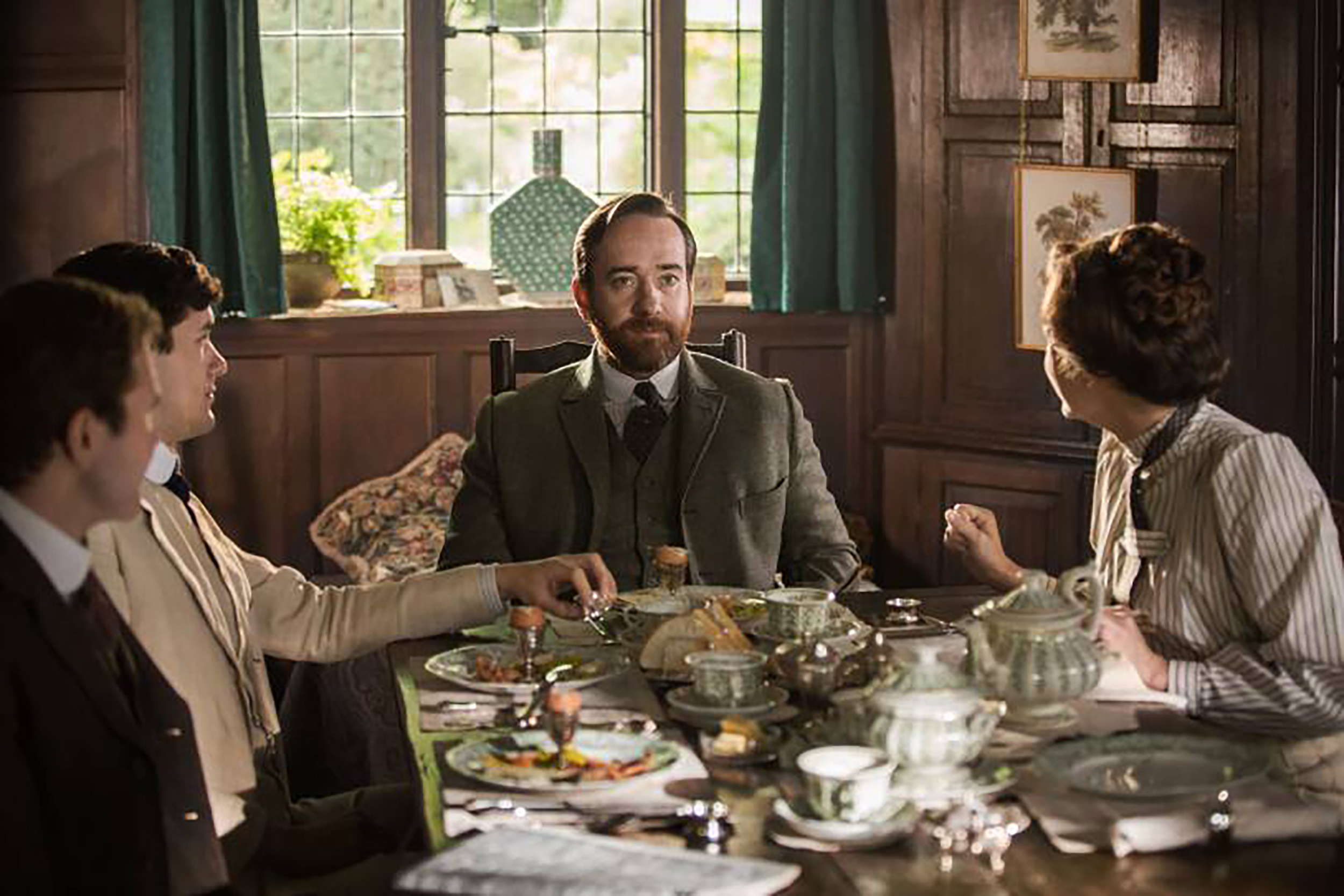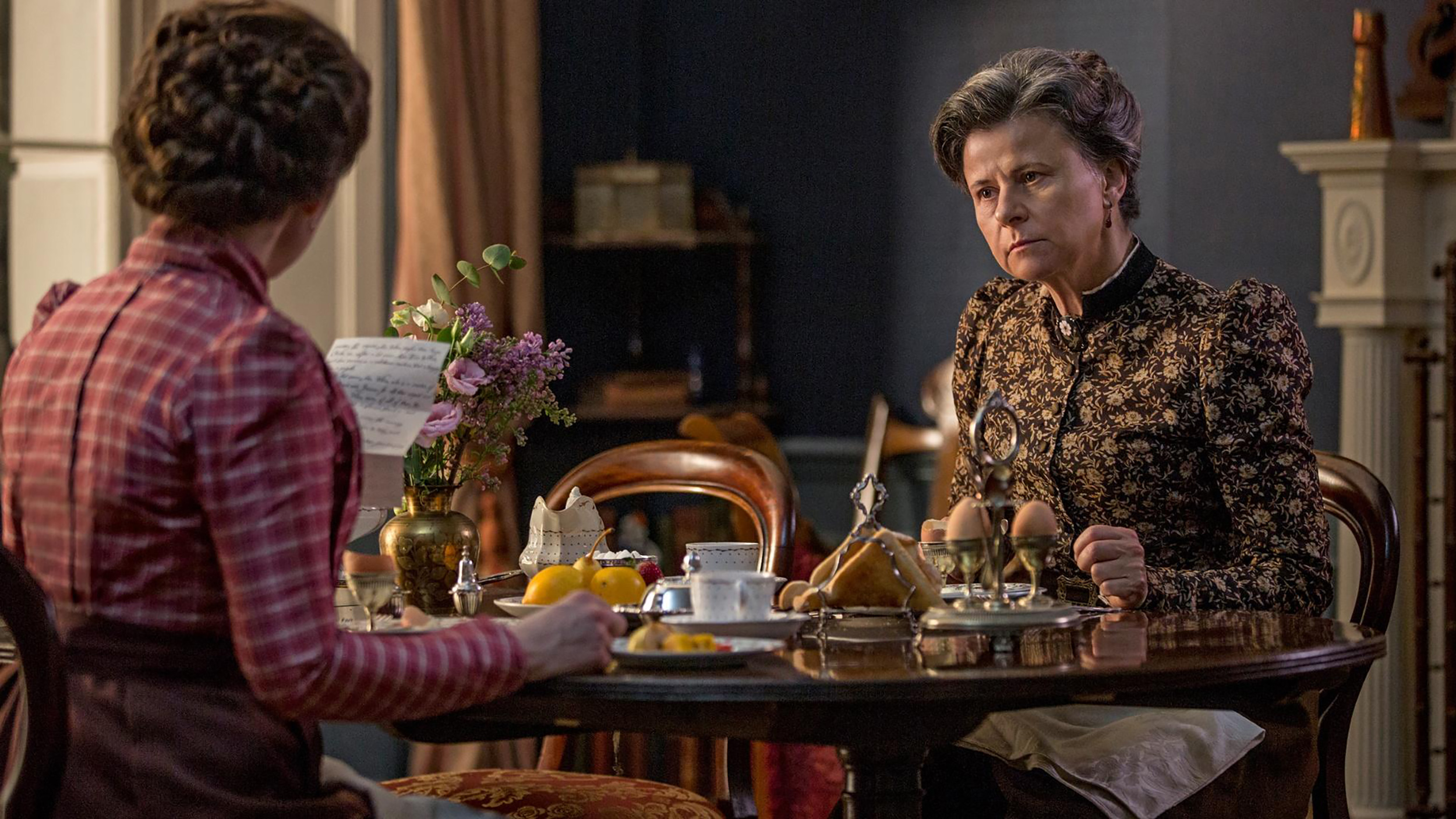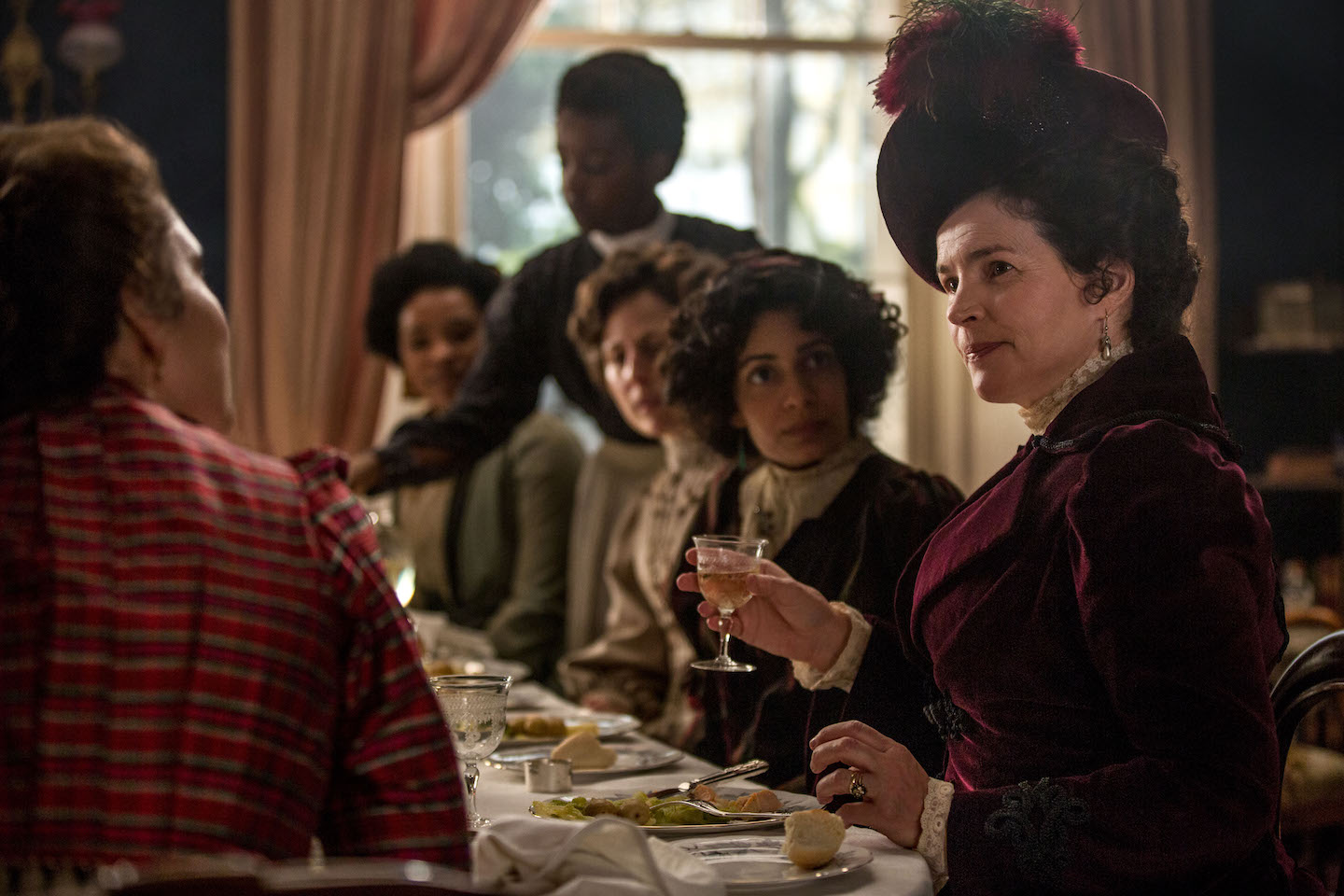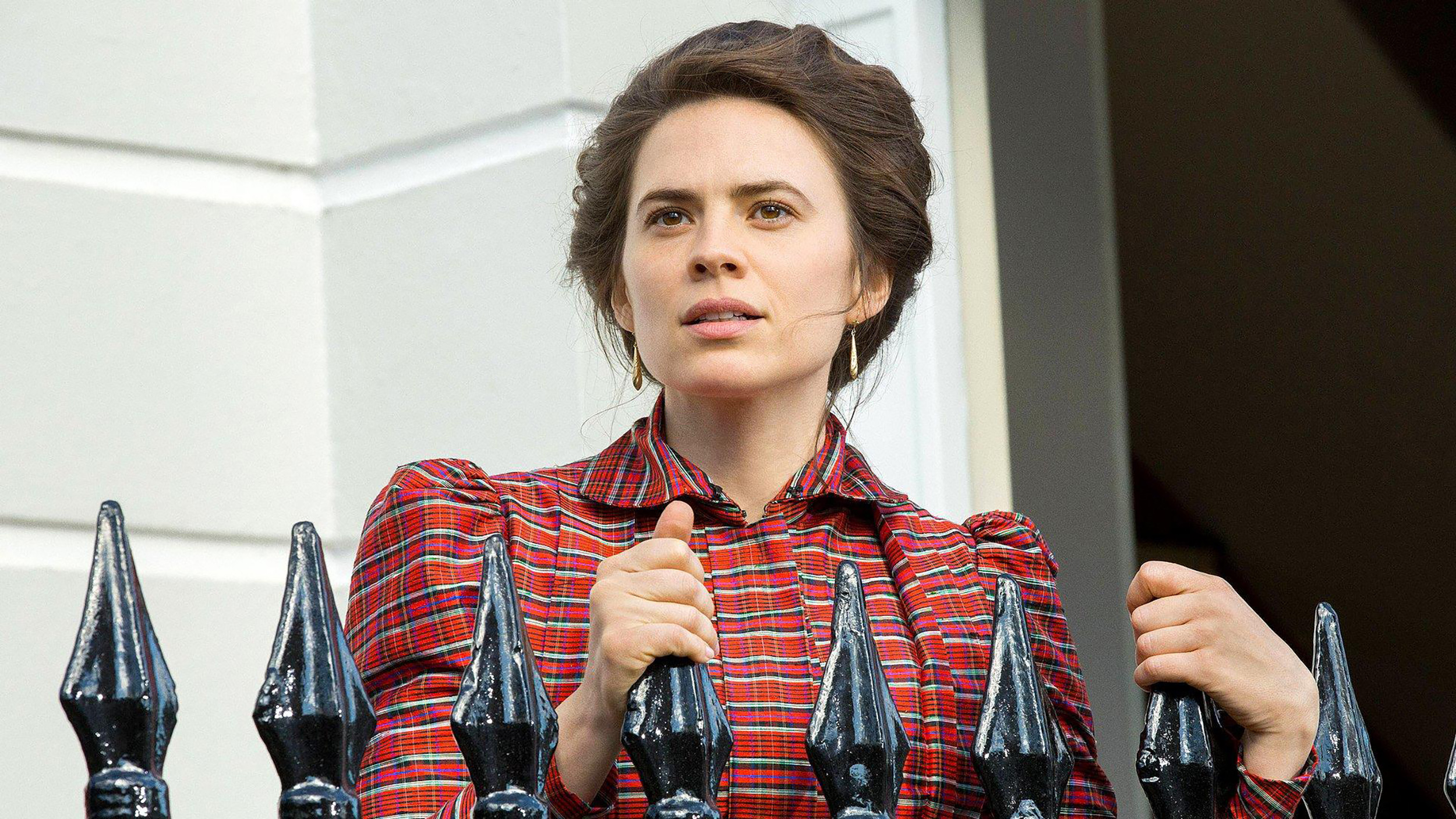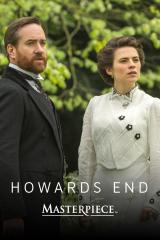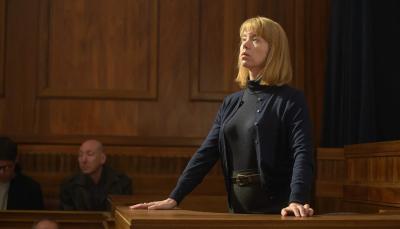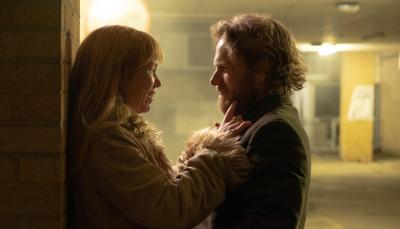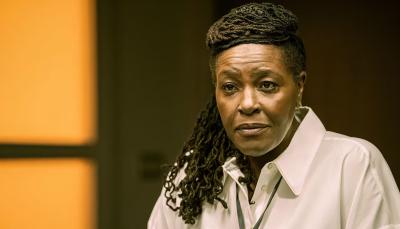'Howards End' Begins with Class, Connections & Family Dynamics
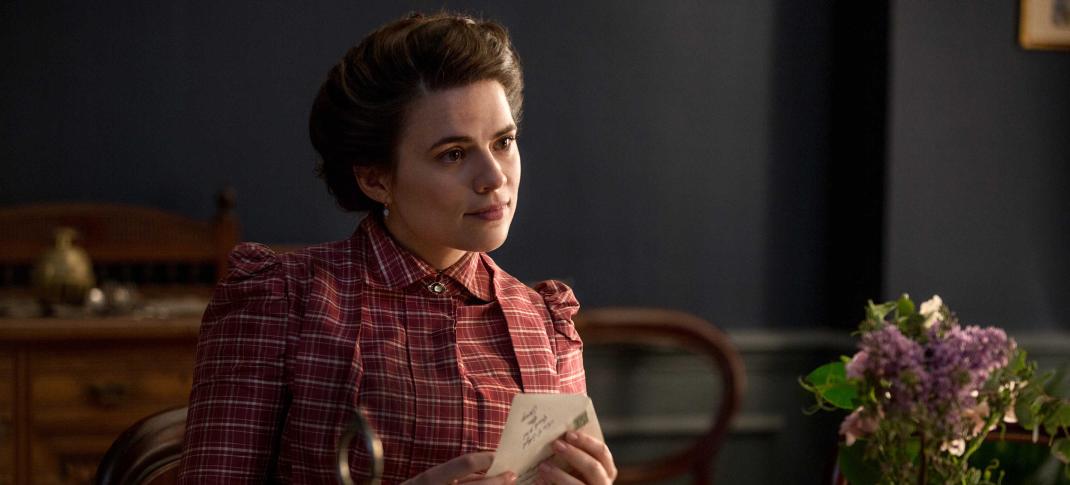
Hayley Atwell as Margaret Schlegel in 'Howards End'
©2017 Starz
Any new adaptation of E. M. Forster’s 1910 novel Howards End has a tough act to follow, namely the much-loved 1992 Merchant Ivory film starring such British acting greats as Anthony Hopkins, Emma Thompson, and Vanessa Redgrave. However, the 2017 version produced by the BBC, initially in partnership with Starz, takes up the challenge admirably, so much so that Masterpiece scooped it up for its own in 2020. Although the first episode starts as a farce of missed timings, postal deliveries, and misunderstandings, we soon discover how intriguing, contradictory, and subtle the characters are.
Queen Victoria died as the first decade of the 20th century commenced, and change was in the air. The Bloomsbury Group proposed revolutionary ideas about love and art; women’s suffrage is a significant issue, and Britain still rules the waves in empire and industry. The titular Howards End is a house; much like the titular Downton Abbey, it functions as a character in its own right, awakening deep feelings and yearnings among the various human protagonists. It can also be seen as a microcosm of Britain itself, reflecting modernity’s detrimental advance and the countryside’s urbanization.
Howards End is a story about class, connection, and family dynamics as represented by three very different households: the Schlegels, half-German, cultured, intellectual, forward-thinking people who question everything; the Wilcox family, who represent empire and industry and question very little because they are secure in their own entitlement; and the Basts, at the lower end of the economic scale, with little power or privilege.
The episode opens with a glowing description of Howards End, as seen through Helen Schlagel's (Philippa Coulthard) eyes in a letter to her elder sister, Margaret (Hayley Atwell). She’s a Wilcox family guest (the sisters met them on a trip to Germany), and she is in love with the house and the family. Industrial magnate Henry Wilcox (Matthew MacFadyen) cheerfully dismisses women’s suffrage (“Bosh!”), a cause the Schlegel sisters passionately support, yet Helen isn't intimidated. She is fascinated and enjoys their directness, although she doesn't care for sports or business. Mr. Wilcox is the alpha male, but Helen has noted that the family always defers to Mrs. Wilcox (Julia Ormond).
Margaret is at home in London with her Aunt Juley (Tracy Ullmann), with whom she has ongoing, relatively cordial battles on her lifestyle, independence, and aversion to marriage. (Actresses and Bohemians are invited to the house!) Aunt Juley is very much old-school Victorian, but she and Margaret are consternated when another letter from Helen announces that she and the youngest Wilcox son are in love.
Margaret wants to travel to Howards End to discover what is happening, but her sickly aesthete brother Tibby (Alex Lawther), suffering from hay fever, wants her to stay and read to him. (Such things required bed rest for the wealthy in 1901 and excessive coddling in Tibby’s case.) So Aunt Juley, very concerned that her younger niece has been compromised, is sent to the rescue (incidentally wearing a stupendous hat. Naturally, a telegram from Helen arrives. She made a mistake; it's all over, but Aunt Juley has already inadvertently broken the news of the romantic entanglement to the Wilcox family, to the shock and embarrassment of all. Helen returns home, and everyone breathes a sigh of relief.
(The clothes in this series are great!)
We’ve already seen evidence of the Schlegel Family lifestyle and beliefs: arty household, colorful, casual clothes, and a tendency to discuss and analyze everything. Now, we accompany them to a Beethoven’s Symphony concert. Tibby has brought a score and is one of those annoying people who conducts while he listens. Helen decides to leave the concert early and, as she does so, takes an umbrella belonging to the stranger sitting next to her. Margaret hands him her card and insists that he come to their house after to collect his property.
This is Leonard Bast (Joseph Quinn), and Margaret has blundered despite her good intentions and generosity. Bast is lower class and poor, betrayed by his accent and frayed cuffs. Very ill at ease, he tells Margaret that he’s also gone to operas and art galleries to improve himself, which prompts Margaret to riff on whether music and the visual arts serve the same purpose. Bast is intimidated by the family's status and wealth and embarrassed when Margaret tries to replace his now-damaged umbrella. He refuses to stay to tea, returning to the shabby apartment he unhappily shares with partner Jacky (Rosalind Eleazar).
Meanwhile, the Wilcox family pops up like prairie dogs at dawn. By a remarkable coincidence, they have rented a flat in the neighborhood opposite the Schlegels. Margaret meets Mr. Wilcox on the street, and they have a surprising warmth and connection.
(Uncharitably, I wondered whether this was why Helen was invited to Howards End and not her elder sister.)
Aunt Juley is upset by the proximity of the Wilcox family. They can see in each other’s windows if they forget to draw the curtains! They will be obliged to meet after the dreadful business of the engagement that wasn’t and act politely! Having had enough of Bohemian life, she leaves, and Margaret decides not to pursue the acquaintance, although we’re unsure why, declaring herself “not home” when Mrs. Wilcox calls to leave a card. Despite assurances that the proximity of the Wilcox family won’t bother her, Helen decides to return to Germany.
Mrs. Wilcox is a woman used to getting her way; she writes to Margaret, scolding her in a friendly sort of way, noting her son, Paul (the object of Helen’s infatuation), is in Africa, working for the family business, the Imperial and West Rubber Company. Shamed, Margaret visits and finds Mrs. Wilcox "taking a few days in bed," the rest of the family having gone to Yorkshire. (Mrs. Wilcox is obviously unwell; Margaret doesn't seem to notice.) Whether nervousness or inattention, Margaret accidentally refers to Paul as in India and is gently corrected. However, the two women develop a tentative friendship, and Margaret invites her to lunch.
Lunch is not altogether successful; another mix of disparate personalities. Mrs. Wilcox, beautifully dressed, sits in silence while Margaret's friends argue and talk loudly. When urged to share her views on women’s suffrage, she quietly announces that she thinks some things are best left to men. An awed and horrified silence falls. Margaret apologizes again. While you’d think that would end the relationship, Mrs. Wilcox invites her Christmas shopping. During their outing, Margaret mentions that the Schlegels will be moving shortly since their house is scheduled for demolition to make way for more luxury apartments like the one the Wilcox family has leased.
Mrs. Wilcox invites Margaret to Howards End, but she claims she can't. She wants to go, though, and when she sees Mrs. Wilcox's cab leaving for the railway station the next day, Margaret dashes after her, meeting up on the platform, about to board a train, and agrees to go with her. Mr. Wilcox and various children swarm around Mrs. Wilcox with cries of delight and bear her onto the train, leaving Margaret behind. As she leaves, she throws Margaret a poignant look — slowed down to frame by frame — and we know they won’t meet again.
While watching, I found this quite moving, but in retrospect, I think I was being hit over the head by it. The gentle satire of the book translates to inconsistencies in the characters: Margaret’s impulsive acts of intended kindness come across primarily as self-centered, and her indecision—from a woman who early on took responsibility for her siblings—is puzzling, suggesting she is as uncomfortable outside her circle as Mrs. Wilcox or Bast are outside theirs.
All the acting is top-notch, particularly that of Quinn, who brilliantly portrays Leonard Bast’s hunger for advancement, simmering resentment, and social awkwardness. The locations in London and elsewhere are fantastic — Vann in Surrey stands in for Howards End. Also, the series portrays London as a multicultural city (as it always has been), which in 2017 was still a radical choice.
This post was originally published January 2020. Updated 11.10.2024
The 2017 adaptation of Howards End will continue on Sundays at 8 p.m. ET on most local PBS stations and the PBS app. All four episodes are available to stream on the PBS Masterpiece Prime Video Channel and for members of PBS Passport.

